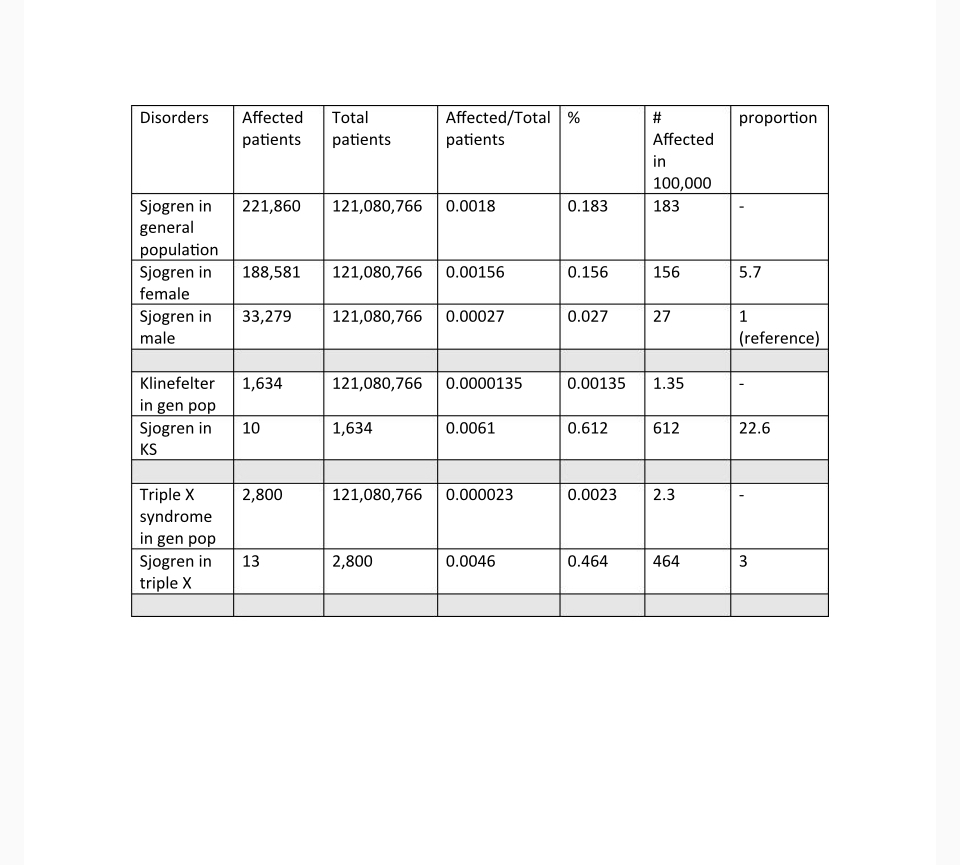Session Information
Date: Monday, November 13, 2023
Title: (1365–1382) Sjögren’s Syndrome – Basic & Clinical Science Poster I
Session Type: Poster Session B
Session Time: 9:00AM-11:00AM
Background/Purpose: Immune-related genes located on the X chromosome are known to be important in the regulation of sex hormones and immune tolerance. It has been postulated that a dose relationship exists between the X chromosome and certain female predominant autoimmune diseases most notable for an increase of SLE in patients with triple X syndrome compared to females with XX karyotype. We investigate the proportion of individuals with Klinefelter syndrome (KS) karyotype 47, XXY and triple X syndrome karyotype 47, XXX who developed Sjogren’s syndrome (SjS) compared with the general population.
Methods: This is a retrospective, multicenter, observational study using the TrinetX global research database. Using ICD-10 codes, we identified patients with the karyotype 47, XXY (KS) and 47, XXX (Triple X syndrome) from 6/1/2000 to 6/1/2023 who developed Sjogren’s syndrome at any time. This was compared with the prevalence of SjS in the general population within the same time frame.
Results: A total of 120,908,054 patients were queried on 6/1/2023 on the Global Collaborative Network. A total of 221,821 patients with Sjogren’s syndrome (188,581 or 85% females; 33,279 or 15% males) were found in general population.A total of 1,637 patients have KS identified by 47, XXY karyotype and 2,467 patients have triple X syndrome identified by karyotype 47,XXX. A total of 10 patients with KS were found to have SjS and 13 patients with triple X syndrome have SjS. Prevalence of SjS in general population is 0.18% (0.16% in females; 0.027% in males). There is a 22.6-fold increase in SjS in KS when compared with male patients in the general populations; and a 3-fold increase in SjS in patients with Triple X syndrome compared to females in the general population.
Conclusion: In this real-world, real-time study, extra X chromosome in Klinefelter syndrome and triple X syndrome have a non-proportional, synergistic dose effect on the risk of developing Sjogren’s syndrome when compared with males and females in the general population, respectively.
To cite this abstract in AMA style:
Palmer A, Tan I. Synergistic Dose Effects of Extra X Chromosome in Development of Sjogren’s Syndrome in Klinefelter and Triple X Syndromes [abstract]. Arthritis Rheumatol. 2023; 75 (suppl 9). https://acrabstracts.org/abstract/synergistic-dose-effects-of-extra-x-chromosome-in-development-of-sjogrens-syndrome-in-klinefelter-and-triple-x-syndromes/. Accessed .« Back to ACR Convergence 2023
ACR Meeting Abstracts - https://acrabstracts.org/abstract/synergistic-dose-effects-of-extra-x-chromosome-in-development-of-sjogrens-syndrome-in-klinefelter-and-triple-x-syndromes/

